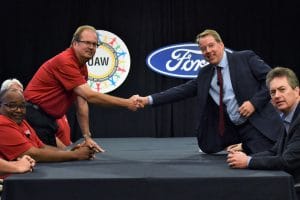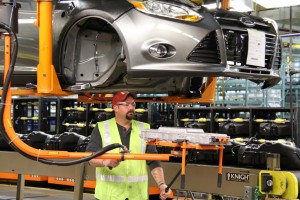
Gary Jones, president of the UAW, (left) offered the ceremonial handshake to Ford Chairman Bill Ford, to mark the opening of contract talks last July.
The United Auto Workers said it had wrapped up a tentative labor agreement, covering 55,000 union members employed by the Ford Motor Co.
Neither side revealed details of the new agreement, though a report by trade publication Automotive News indicated it contained as much as $6 billion in new product and plant investments that would retain or create as many as 8,500 jobs.
“Our national negotiators elected by their local unions have voted unanimously to recommend to the UAW-Ford National Council the proposed tentative agreement,” said Rory Gamble, UAW vice president in charge of negotiations with Ford.
(UAW Workers Ratify GM Contract)
Ford and the UAW have been discussing the new contract since July but talks were put on hold in mid-September as the union focused on General Motors. Union bargainers returned to Ford last Monday after a settlement was ratified by 47,000 workers at GM ending a more than month-long strike.
“Out of respect for our members, we will refrain from commenting or releasing full details of the agreement until the UAW-Ford Council leaders meet and review the details,” Gamble said late Wednesday after confirming a settlement covering 55,000 Ford workers in the U.S. had been reached.

Ford was able to avoid the strike that shut down GM for six weeks and cost it an estimated $3 billion.
The UAW-Ford National Council, which is made up of local union officers, will meet Friday in Detroit to go over details of the tentative Agreement. If they give the thumbs up, the settlement then will go to all Ford hourly and salary members for a ratification vote.
Members of the UAW employed by GM ratified a new four-year contract Friday that maintained the health care benefits without any cost increases and included pay increase, an $11,000 ratification bonus, a path to top wages for new hires and a separate path for temporary employees to become full-time employees after three years of continuous service.
The settlement at GM concluded a 40-day strike that cost GM more than $3 billion and forced GM to reduce its outlook for fourth quarter earnings. Union members began returning to work the Saturday after ratification
While, he declined to discuss the details of the tentative agreement, Gamble indicated that the it follows the “pattern” set at GM. “Our negotiating team worked diligently during the General Motors strike to maintain productive negotiations with Ford. The pattern bargaining strategy has been a very effective approach for UAW and its members to secure economic gains around salary and benefits,” he said.

While contract details have yet to be released, Ford was expected to follow GM in improving wages and benefits for contract and “in-progression” workers.
According to Automotive News, a keystone of the Ford agreement is an investment of $6 billion in new product and plant upgrades. It is uncertain if Ford will emphasize electrified vehicles, as did GM which included in its $9 billion program the addition of a new all-electric pickup to be built at a plant in Detroit that had originally been scheduled to close.
(GM workers heading back to their assembly lines.)
Early indications are that Ford will also provide a substantially lower signing bonus than the $11,000 per worker figure included in the GM settlement.
Ford is widely expected to have followed the pattern set by GM – if not the precise language – concerning contract and transitional workers. The bigger automaker agreed to cut in half the amount of time it takes for “in-progression” hourly workers to reach peak pay and benefit levels. It also agreed to reclassify temps with at least three years so they could also work towards top pay and benefits.
For his part, Bill Dirksen Ford vice president of labor affairs, said, “Ford can confirm the UAW’s announcement that the UAW and Ford have reached a proposed tentative agreement on a four-year contract. Further details will be provided at a later date,” he said.
(End of Ford Flex means 450 job cuts at Oakville, ON plant.)
In the days ahead, the UAW is expected to move on to Fiat Chrysler Automobiles where talks also were put on hold in September. That automaker could face challenges addressing the contract and in-progression job issue as it has more of those, as a percentage of its workforce, than either GM or Ford.
Further complicating matters, the UAW will be well aware of the tentative merger plans between FCA and French automaker PSA. Such a deal could lead to significant rationalization of the combined company’s global manufacturing base.
As a result, the union will “want to make sure the merger doesn’t cost jobs,” said Art Schwartz, a former GM negotiator and now head of Detroit-based Labor and Economics Associates.
Paul A. Eisenstein contributed to this report
